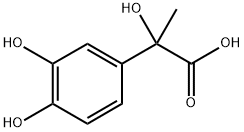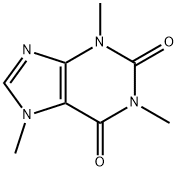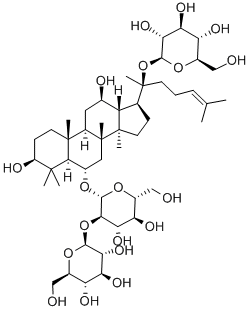Panax Ginseng extract
- CAS NO.:50647-08-0
- Empirical Formula: C42H66O17
- Molecular Weight: 842.96324
- Update Date: 2025-12-17 09:50:04

What is Panax Ginseng extract?
Chemical properties
Ginseng is among the world’s most well-known herbs A number of species of ginseng grow around the wolrd Several species and varieties of ginseng are recognized from different countries The two most commonly used species are P folium L and P ginseng C A Meyer Ginseng has a perennial, fusiform, whitish, thick and feshy root, transversely wrinkled and terminating in fbers The roots mature slowly and are harvested only after the frst 3 years The stem is round, smooth, green, often with a tinge of red, about 30 cm (1 ft) high, regularly divided at the top into three petioles, with a fower-stalk in the center The petiole is round, smooth and swollen at the base; leaves 3 to 7, ternate, quinate, or septentate that drop in the fall Flowers are small, greenish, in a simple umbel, supported by a round, slender peduncle, which rises from the top of the stem in the center of the petioles The plant bears a cluster of red or yellowish fruits from June to July The berries are kidney-shaped, retuse at both ends, compressed, of a bright- scarlet color, crowned with a calyx and styles, and contain two and sometimes three semicircular seeds Root is the part used It has a faint smell and the taste is sweetish, somewhat bitter, mucilaginous and feebly aromatic.
The Uses of Panax Ginseng extract
Panax ginseng extract is used in preparation of α-Hederin Solid dispersion and its Cyclodextrin inclusion.
Definition
ChEBI: Prosapogenin is a triterpenoid saponin.
Composition
As early as 1854, a saponin called panaquilon was obtained from an aqueous infusion of P quinquefolium * Several classes of compounds have been isolated from ginseng root These include triterpene saponins, essential oil-containing polyacetylenes and sesquiterpenes, polysaccharides, peptidoglycans, nitrogen-containing compounds, and various ubiquitous compounds, such as fatty acids, carbohydrates and phenolic compounds Several studies have focused on the steroid-like compounds called ginsenoside Five new dammarane-type triterpene oligoglycosides called quinquenosides I, II, III, IV and V were isolated together with 14 known dammarane-type triterpene oligoglycosides such as chikusetsusaponin IVa, pseudo-ginsenoside-RC1, malonyl-ginsenoside-Rb1, and notoginsenosides-A,-C, and -K from the 1-butanol-soluble fraction From the ethyl acetate-soluble fraction, four known acetylenic compounds and 6?-O-acetyl ginsenoside-Rg1 were isolated.
Properties of Panax Ginseng extract
| Melting point: | 280℃ |
| Odor | at 100.00 %. ginseng |
Safety information for Panax Ginseng extract
| Signal word | Warning |
| Pictogram(s) |
 Exclamation Mark Irritant GHS07 |
| GHS Hazard Statements |
H302:Acute toxicity,oral |
Computed Descriptors for Panax Ginseng extract
Panax Ginseng extract manufacturer
New Products
Indole Methyl Resin tert-butyl 9-methoxy-3-azaspiro[5.5]undecane-3-carboxylate Boc-His(Boc)-OH 2-CTC Resin 4-Chloro-7-tosy1-7Hpyrrolo[2,3-d]pyrimidine 5,7-Dibromo-1H-indole 2,5-dichloro-N-hydroxy-4,6-dimethylpyridine-3-carboximidamide 2,2-Dimethoxy-7-azaspiro[3.5]nonane hydrochloride 4-chloromethyl-5-methyl-1,3-dioxol-2-one (DMDO-Cl) R-2-BENZYLOXY PROPIONIC ACID 1,1’-CARBONYLDIIMIDAZOLE 1,1’-CARBONYLDI (1,2-4 TRIAZOLE) N-METHYL INDAZOLE-3-CARBOXYLIC ACID 4-((2-hydroxyethyl)thio)benzoic acid 1-(TERT-BUTOXYCARBONYL)-2-PYRROLIDINONE Methyl 6-methylnicotinate 3-Pyridineacrylic acid tert-Butyl carbazate TETRAHYDRO-2H-PYRAN-3-OL 2-((4-morpholinophenylamino) (methylthio) methylene) malononitrile 3-(4-morpholinophenylamino)-5-amino-1H-pyrazole-4-carbonitrile 2,4-dihydroxybenzaldehyde 1,3-Diethyl-1,3-Diphenylurea Methyl 2-methylquinoline-6-carboxylateRelated products of tetrahydrofuran








You may like
-
 50647-08-0 98%View Details
50647-08-0 98%View Details
50647-08-0 -
 Ginseng 98%View Details
Ginseng 98%View Details
50647-08-0 -
 Ginseng 50647-08-0 98%View Details
Ginseng 50647-08-0 98%View Details
50647-08-0 -
 50647-08-0 99%View Details
50647-08-0 99%View Details
50647-08-0 -
 Ginseng 98%View Details
Ginseng 98%View Details
50647-08-0 -
 50647-08-0 Ginseng 99%View Details
50647-08-0 Ginseng 99%View Details
50647-08-0 -
 50647-08-0 98%View Details
50647-08-0 98%View Details
50647-08-0 -
 50647-08-0 Ginseng 98%View Details
50647-08-0 Ginseng 98%View Details
50647-08-0
